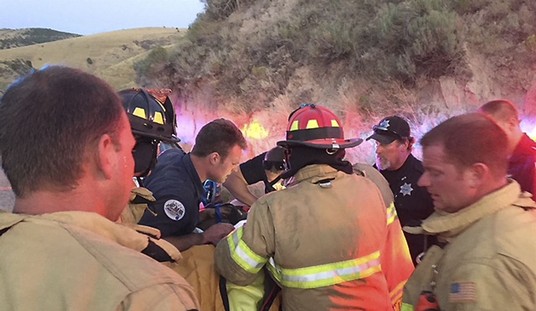True enough, Jesus never once mentions abortion in the words recorded by his disciples from His ministry. He never mentions the practice of sacrificing children to Moloch either (Leviticus 18 and 20, Kings 16), but we can assume He didn’t intend that omission as an endorsement.
That in fact is the fallacy at the heart of this argument, in which Joe Scarborough passionately argues that people need to read the “red letter” portions of the Bible to get their heads straight on what Jesus wants. Joe seems pretty convinced that Jesus wanted people to have access to abortion to deal with their hopelessness from the simple fact of its omission from His quoted teachings, and that suggesting otherwise is a form of “heresy”:
.@JoeNBC suggests Jesus Christ supported abortion: "Jesus never once talked about abortion. And it was happening back in ancient times. It was happening during his time. Never once mentioned it. For people perverting the gospel of Jesus Christ down to one issue, it is heresy." pic.twitter.com/DjxSLGRQfI
— Tom Elliott (@tomselliott) September 9, 2022
Curiously, although the Gospels give no specific reference to Jesus’ teaching about abortion, the early Church seemed very clear on the issue. To Joe’s point, abortions occurred at that period too, and the generation after the Apostles made it clear that it was anathema to Christians. The Didache, a first-century catechism for Christians, explicitly prohibits abortions:
“The second commandment of the teaching: You shall not murder. You shall not commit adultery. You shall not seduce boys. You shall not commit fornication. You shall not steal. You shall not practice magic. You shall not use potions. You shall not procure [an] abortion, nor destroy a newborn child” (Didache 2:1–2 [A.D. 70]).
As I wrote earlier when Nancy Pelosi tried claiming that abortion opposition was only a modern innovation, other early Church doctors also taught against it. Tertullian, for instance, is known as the Father of the Latin Church, and inveighed against the practice — in some cases, with great specificity:
“In our case, a murder being once for all forbidden, we may not destroy even the fetus in the womb, while as yet the human being derives blood from the other parts of the body for its sustenance. To hinder a birth is merely a speedier man-killing; nor does it matter whether you take away a life that is born, or destroy one that is coming to birth. That is a man which is going to be one; you have the fruit already in its seed” (Apology 9:8 [A.D. 197]).
“Among surgeons’ tools there is a certain instrument, which is formed with a nicely-adjusted flexible frame for opening the uterus first of all and keeping it open; it is further furnished with an annular blade, by means of which the limbs [of the child] within the womb are dissected with anxious but unfaltering care; its last appendage being a blunted or covered hook, wherewith the entire fetus is extracted by a violent delivery.
“There is also [another instrument in the shape of] a copper needle or spike, by which the actual death is managed in this furtive robbery of life: They give it, from its infanticide function, the name of embruosphaktes, [meaning] “the slayer of the infant,” which of course was alive. . . .
“[The doctors who performed abortions] all knew well enough that a living being had been conceived, and [they] pitied this most luckless infant state, which had first to be put to death, to escape being tortured alive” (The Soul 25 [A.D. 210]).
Sounds a bit like an early D&C, eh?
Saint Hippolytus, who sometimes found himself in conflict with the Church hierarchy, nevertheless agreed completely on abortion. He made the point that abortion managed to combine the sins of adultery and murder at the same time:
“Women who were reputed to be believers began to take drugs to render themselves sterile, and to bind themselves tightly so as to expel what was being conceived, since they would not, on account of relatives and excess wealth, want to have a child by a slave or by any insignificant person. See, then, into what great impiety that lawless one has proceeded, by teaching adultery and murder at the same time!” (Refutation of All Heresies [A.D. 228]).
My guess? These early church leaders were pretty familiar with the Gospels, and also with the concept of heresy. (Saint Hippolytus wrote this as a refutation of heresy, as noted.) They also seem like better resources on Jesus and heresy than a political talk-show host — or for that matter, a political commentator like myself. YMMV, of course.
What about Joe’s other point on Jesus’ exhortations to serve others? One would think that the same Person who commanded “Suffer the little children to come unto me” could be assumed to have meant that in ways that didn’t involve killing them in the womb, but Joe raises a good point about the suffering of those who are in crisis pregnancies. That’s not just limited to minors who have been raped and women who are ill, but a wide range of situations where pregnancy creates distress and hopelessness. Are we not called to assist?
Indeed, we are called to assist as the body of Christ — but assist in providing hope and love for the mother as well as the child. Do we fall short of that in the abortion debate at times? We do, but Christians, Jews, and other faiths step up in other ways, such as with crisis pregnancy centers and adoption services, which have been unfairly maligned and in some cases physically and politically attacked for their efforts. We can do better to bring those sensibilities into the political debate and policy discussions around abortion, but don’t pretend that these efforts don’t exist at all.
And let’s not pretend either that today’s Christians are just ignoring the teachings of the Church in opposing abortion. That’s hardly a charitable approach to this debate, and I know from personal experience that Joe can do much better than this. And he has.








Join the conversation as a VIP Member